Divine Monarchy, Divine Society: Trinitarian thought and socio-political change – a 17th century study
M. Threlfall‐Holmes
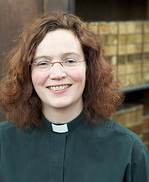 Miranda Threlfall-Holmes is currently Chaplain & Solway Fellow of University College, Durham, and from September 2012 will become Vicar of Belmont & Pittington, in Durham Diocese. After a degree in history at Cambridge she first worked in brand management, then studied for a PhD in medieval history at Durham, lectured part-time at Newcastle University, and was a lay volunteer chaplain at the Royal Victoria Infirmary in Newcastle. She trained for ordination at Cranmer Hall in Durham, and was a curate at a parish in Heaton. She has been involved in ordination and lay theological training in Durham and Newcastle dioceses for several years. As a historian and a theologian she has written and published extensively in both the academic and popular media. Her doctoral thesis Monks and Markets: Durham Cathedral Priory 1460-1520 was published by Oxford University Press in 2005, and with Mark Newitt she edited and co-wrote Being a Chaplain (SPCK, 2011). Her most recent book is The Essential History of Christianity (SPCK, 2012), a short and accessible guide to the whole of Christian history.
Miranda Threlfall-Holmes is currently Chaplain & Solway Fellow of University College, Durham, and from September 2012 will become Vicar of Belmont & Pittington, in Durham Diocese. After a degree in history at Cambridge she first worked in brand management, then studied for a PhD in medieval history at Durham, lectured part-time at Newcastle University, and was a lay volunteer chaplain at the Royal Victoria Infirmary in Newcastle. She trained for ordination at Cranmer Hall in Durham, and was a curate at a parish in Heaton. She has been involved in ordination and lay theological training in Durham and Newcastle dioceses for several years. As a historian and a theologian she has written and published extensively in both the academic and popular media. Her doctoral thesis Monks and Markets: Durham Cathedral Priory 1460-1520 was published by Oxford University Press in 2005, and with Mark Newitt she edited and co-wrote Being a Chaplain (SPCK, 2011). Her most recent book is The Essential History of Christianity (SPCK, 2012), a short and accessible guide to the whole of Christian history.
Abstract
The idea of a social doctrine of the Trinity, that ‘the trinity is our social programme’, has become commonplace in much of Christian thought today. This research puts twentieth century Trinitarian thought into perspective by taking a long historical view. Throughout Christian history, the assumption has been made that the inherent nature of God, and particularly the inter‐personal relationships modelled by the persons of the Trinity, necessitates or validates particular social, political and ecclesiastical structures. In this brief paper the main historical focus is on England in the long seventeenth century, used here as a case study since it provides the natural laboratory of a context in which both Trinitarian thought and traditional understandings of the state were undergoing considerable upheaval. The use of the doctrine of the Trinity to justify monarchy is discussed, and then the ways in which this was modified during the revolutionary period is considered.
The idea of a social doctrine of the Trinity, that ‘the trinity is our social programme’, has become commonplace in much of Christian thought today. Notwithstanding some recent criticism of the concept, it is widely considered selfevident that a properly Trinitarian understanding of God should transform our political, social and ecclesiastical relationships. The particular forms that the social doctrine of the Trinity has taken in recent decades are very much the product of the social, economic and political context of the twentieth century: but this is nothing new. My current research attempts to put twentieth century Trinitarian thought into perspective by taking a long historical view, tracing the development of Trinitarian thought in Western Europe alongside social, economic and political developments. I’m looking in particular at the rhetorical application of the doctrine of the Trinity to the ordering of society and to specific forms of government. Throughout Christian history, the assumption has been made that the inherent nature of God, and particularly the inter‐personal relationships modelled by the persons of the Trinity, necessitates or validates particular social, political and ecclesiastical structures. In this brief paper the main historical focus is on England in the long seventeenth century, used here as a case study since it provides the natural laboratory of a context in which both Trinitarian thought and traditional understandings of the state were undergoing considerable upheaval.
Taking a very broad historical overview, the medieval period in Western Europe saw the rise of the nation state, and the establishment of increasingly stable societies, held together by commercial and monetary interests as much as by political will. The typically medieval world‐view of a divinely ordered hierarchy emerged and flourished in conversation with this political, and social context. Social, political and ecclesiastical hierarchies were all justified and conceptualised in terms of this understanding of divine order. This concept of divine hierarchy was predicated upon a distinctively hierarchical view of the Trinity – which was heretical in theory, yet fairly ubiquitous in practice. David Brown noted in his article ‘The Trinity in Art’ that such a residual notion of the Father as the superior member of the Trinity may well have been behind the iconoclastic controversy. God the Father was at the top of the pyramid of creation, if not in the strictest theological understanding, then certainly in the popular imagination.
An illustration for the Hours of the Trinity in the Book of Hours of Catherine of Cleves shows how this hierarchical understanding of the pyramid of creation could be translated or imagined in the context of church order.
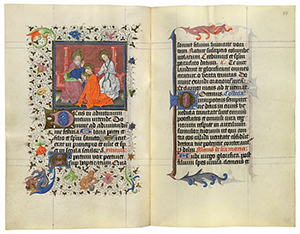
Here God the Father is shown wearing a papal tiara, ordaining the Son for his mission on earth. Such explicit illustration of hierarchy within the Trinity was unusual, however. Much more common was the simple assumption that since God reigns in heaven, monarchy and hierarchy are inevitably God’s plan for the ordering of human society.
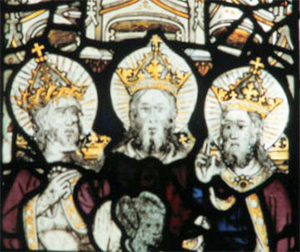
The language and imagery of kingship were part of the stock imagery for God, as in this stained glass window from Goodramgate in York, dating from 1470, which shows the Trinity as three kings, crowning the Virgin Mary.
The quintessentially medieval world‐view of a hierarchical ‘pyramid’ of creation, with each estate and sort of person having their place in the divine ordering of society, remained a fundamental assumption about how the world was well into the early modern period. This image is from 1579.1

The foundation texts of the early Church of England, the BCP and the Homilies, based their apologetic for the royal supremacy and the national church on this paradigm. The ‘Homily on Good Order’, for example, begins with a poetic and sweeping survey of the order of creation.
‘Almightie God hath created and appointed all thinges in heaven, yearth and waters in a moste excellent and perfect ordre. In heaven, he hath appoynted distinct orders and states of archangelles and angels. In yearth, he hath assigned kynges, princes, with other governors under them, all in good and necessary ordre…[nature also keeps its order, with the seasons]…Every degre of people, in their vocacion, callyng and office, hath appoynted to them their duetie and ordre. Some are in high degre, some in lowe, some kynges and princes, some inferiors and subjectes, priestes and laimen, masters and servauntes, fathers and chyldren, husbandes and wifes, riche and poore, and every one have need of other: so that in all thinges is to be lauded and praysed the goodly ordre of God.’2
The attraction of such a view was not merely its antiquity, nor its nearubiquity in the popular imagination, but also, crucially, its inherent tendency to promote social stability. It was the explicit intention of the homilies to promulgate a theory of government, grounded in the doctrine of God, which would contribute to a peaceful realm. 3 The rule of the monarch is presented as analogous to the rule of God, and being a good and obedient subject is identified with being a Christian. ‘heaven’, we are told, ‘is the place of good obedient subjectes, and hell the pryson and dungeon of rebels against God and their prince’.4
Obedience, in the words of the 1570 ‘Homilie against Disobedience and Wylfull Rebellion’, is presented as ‘the principal vertue of al vertues’.5 Reimagining the medieval spirituality of the imitation of Christ the homilies identify Jesus’s obedience both to the Father’s will and to the earthly authorities as the main aspect of his life and teaching which Christians are called to emulate. Furthermore, salvation itself is vested in Christ’s obedience, as repairing the disobedient sin of Adam, and Christ is described as the one ‘that was obedient for us al, even to the death of the crosse’.6 In places, the obedience of Christ to the will of the Father is envisaged precisely as the transaction between persons of the Trinity by which atonement is achieved.7 The doctrine of the Trinity that is expressed in these texts is itself therefore a hierarchical one, in which the very essence of God, with the Son subordinate to and willingly obedient to the Father, expresses and justifies the hierarchical principle and by extension the claim of the monarch to the obedience of her subjects.
Against this background, the seventeenth century saw a distinctive shift in the way in which the divine nature was used rhetorically to justify monarchical authority. As the seventeenth century progressed, absolutist models of monarchy developed and became more prominent across Europe. Whilst the extent to which this marked a real change in peoples’ conceptions of monarchy has been questioned, it was certainly the case that across Europe governments became increasingly centralised and power became increasingly concentrated in the hand of national monarchs and their courts.8 Alongside this development in patterns of power and sovereignty arose a literature and rhetoric legitimating absolute monarchy as a concept, beginning with Bodin in late sixteenth century France.9 Alongside this trend, the use made of the Trinity in political rhetoric shifted from an emphasis upon the persons of the Trinity at the top of a universal hierarchy, to an emphasis upon the sole monarchy of God. This point of view emphasised authority and sovereignty rather than obedience and subjecthood, and drew parallels between God and king which emphasised their ontological distinction from their subjects rather than their superior place on a natural continuum.
England was to some extent a special case in Europe in generally maintaining a more limited form of monarchy. Absolutist theories were certainly presented in English royalist literature throughout the seventeenth century, notably by James I in his ‘True Law of Free Monarchy’ and ‘Basilikon Doron’, and notoriously by Filmer in his ‘Patriarcha’.10 Though these were at the extreme end of the spectrum, such ideas can be seen throughout a wide range of literature. For example, in John Donne’s meditations on his illness in the winter of 1623, he reflects upon the fact that Charles I has sent his own doctor to tend to him. This gives rise to a distinctly sycophantic reflection on the nature of kingship, dwelling at length on the god‐like qualities of all kings and of this one in particular. ‘Are they gods?’ Donne asks rhetorically: ‘He that calld them so, cannot flatter’.11 Kings are God’s ‘Vice‐gerents’, and Donne argues that those who are prepared to speak irreverently of the king ‘prepare a way of speaking negligently, or irreverently’ of God himself.12
A polemical pro‐monarchy poem, published after the Restoration by an obscure author called Dormer, shows this tendency at its height.13
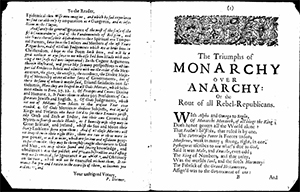
The poem praises the unity of God’s rule, and argues that absolute monarchy is the best form of government because it most closely approximates to this divine model: ‘that realm’s lik’st his, that ruled is by one’. Monarchy as a concept is so important to the author of this poem that redemption is situated not in the incarnation, crucifixion or even resurrection of Jesus, but in his subsequent coronation in his heavenly throne at the right hand of God the Father.
‘The Jews and Gentiles restauration
Began with Christ his Coronation’.14
However, the majority of English royalist literature, especially after the Civil War, advocated a more limited form of divine‐right monarchy.15 But even the limited monarchy advocated by mainstream royalists in the seventeenth century saw a marked shift from the hierarchical paradigm of the earlier period, to an increasing emphasis on the unique position held by the monarch in society. This can be seen in the 1662 Prayer Book in the new forms of prayer for the Gunpowder Plot, the martyrdom of Charles I and the restoration and birthday of Charles II. Most notably, the reign of the monarch is not superseded by that of heaven, but continues in it. God is asked that the king may ‘duly serve thee on earth, that he may hereafter everlastingly reign with thee in heaven’, and the language throughout draws clear parallels between God and King.16
There were of course also dissenting or ambivalent voices, and not simply from within the ranks of the radicals. One of the key themes explored by George Herbert in his poetry was the two‐way metaphor of kingship and the royal court, and divinity, and he used the vocabulary of social transactions between an inferior and a superior extensively to explore his relationship with God. But there is a deep ambivalence in his verse about this relationship.
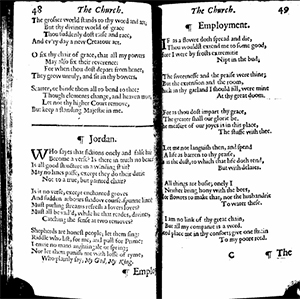
Herbert claims (in Jordan (1)) that he wants to ‘plainly say, My God, My King’; but in the context of seventeenth century debate, this phrase itself is deliberately ambivalent about whether he is endorsing the analogy between divine and earthly kingship, or subverting it by claiming that God alone is the true king.
This was a very live issue, since the key theological task facing radicals and reformers was to attempt to counter the rhetorical claim that the very nature of God required monarchical government. This rhetorical claim was most clearly contained in the trope of Christ the King, a conventional and biblical concept which was routinely used, either deliberately when monarchy was under attack, or unconsciously by association, to defend the concept of monarchy itself as a good and godly institution. If Christ is a king, kings must be a good thing. For most people, the imagery of Christ the King remained axiomatic, even in the particularly fraught context of the civil war and regicide of Charles I in the mid seventeenth century. Indeed, questioning the use of kingship language in relation to Christ was an extremely dangerous activity. Questioning Christ’s kingship was very closely associated with Unitarianism and so with denying Christ’s divinity, and a growing, though always minor, Unitarian movement was perceived as a very real threat to faith in later sixteenth and seventeenth century Europe. In England, Unitarian ideas never gained much of a foothold in reality, but were seen as such a threat that they sparked a fresh outpouring of literature defending Trinitarian doctrine. An ordinance of 1648 made the denial of the Trinity a capital offence (though this penalty was never enforced) and Unitarian views were explicitly excluded from the 1689 Toleration Act and the 1670 Conventicle Act.17 The trope of Christ the King therefore remained non‐negotiable in mainstream political discourse throughout the Civil War period.
And so even those radicals who opposed human kingship and wished to propose alternative visions of the ordering of society were constrained not to oppose the notion of kingship in principle, but to re‐imagine it. This was done, often in apocalyptic terms, by describing kingship as properly belonging solely to Christ himself, with that heavenly government being administered here on earth by the direct guidance of the Holy Spirit.18 It was then possible to argue that human kingship was blasphemous, a line of argument considerably helped by the intemperate nature of some of the absolutist literature of the time.
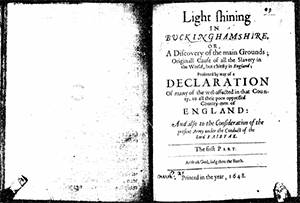
The author of the Leveller tract ‘Light Shining in Buckinghamshire’ (1649) pointed out that many defences of monarchy were heretical, because they made the king ‘God on earth’ and ‘their third person of the Trinity’.19
It remains an intriguing question to what extent Unitarian thought may have contributed to the development of emerging alternative social models. There is some suggestion that Locke’s change of heart from his advocacy of absolute monarchy to the idea of a social contract for which he is famous paralleled his developing interest in Unitarian ideas.20 It is also an intriguing question to what extent the same currents of thought which resulted in the absolutist paradigm of God and society may have also contributed in contrast to the development of Unitarian ideas, which arose and developed on a very similar timescale.
In the political turmoil of the mid seventeenth century it seemed possible at times that radical views might prevail, but after the chaos of the Civil War the Restoration was widely greeted with relief and a degree of pragmatism. The alternative had been shown to be no better. When John Milton, who had been Cromwell’s chaplain and somehow survived the Restoration, wrote ‘Paradise Lost’, a key part of Satan’s rebellion against God is anger at his absolute rule. Hell and the situation of the fallen angels is portrayed as more equal at first, yet the rule of Satan is still effectively a type of monarchy – the other fallen angels still bow down in awe at his magnificence and his rule is self‐evidently no more benign than that of an absolute monarch.
By the beginning of the eighteenth century, despite – and to some extent because of – the turmoil of the intervening century and a half, the close rhetorical correlations between the duties owed to God and to monarch, and between being a good subject and a good Christian, remained superficially intact. It remained part of the conventional rhetoric of public life to say, as was preached in a sermon before the Queen in 1712, that ‘The Religion and the Loyalty of a Christian are inseperable; the Duties we owe to God and His Viceregent are of the closest Alliance’.21 Yet the debates and conflicts of the intervening years had inevitably altered not only much of the other content of such sermons, but also the context in which such conventional statements as this were understood. As well as the political upheavals of the Civil War, which had resulted in a healthy suspicion of claims to power and to divine authority, the debates of the latter half of the seventeenth century over the origins of human society, typified by the work of Hobbes and Locke, had left their mark. Whilst few clerics would go so far as to deny God’s agency in creation yet, by the end of the seventeenth century they were notably more ambivalent about a causal link between the nature of God and the nature of society and government. A sermon to parliament in 1711, for example, argued merely that monarchy by long use ‘looks very much like the Appointment of God and Nature’.22 The aim of religion was now to make a ‘good and honest’ member of society, not a good and obedient subject. 23
Although at times crowds still flocked to seek the cure of the king’s touch, the theory of monarchical divinity had become increasingly strained. For those who still clung to it, the succession crisis decisively revealed the fracture lines. As a result of all these strands, by the end of the seventeenth and the beginning of the eighteenth century monarchy in England was widely tacitly understood as simply a useful form of government rather than a branch or reflection of divinity. If God did indeed appoint the monarch, a question which many preferred not to address, it was because it was useful for us rather than because it was essentially divine. It is notable that, from this period onwards, the doctrine of the Trinity itself fell into disuse in political theology. No longer essential as a bastion of monarchy and hierarchy it even became an embarrassment to many in the Church over the eighteenth and nineteenth centuries, as rationalism, spearheaded by the Unitarianism of the late sixteenth and seventeenth centuries, took hold. There are however some fascinating glimpses of new political realities being read onto the godhead. For example, Nicholls has pointed out that in the eighteenth century, as real power was increasingly wielded by the government rather than by the monarch, some administrative analogies were used for the Trinity, such as Christ being referred to as the ‘Prime Minister’ of God the Father in the hymnody of Isaac Watts.24
But not until the late nineteenth and twentieth centuries, with the memories of the monarchical usages of Trinitarian doctrine well in the past, was the doctrine of the Trinity once again explicitly pressed into service in political theology, this time in the cause of a radical social programme of inclusion and diversity.25 Contemporary political theology from the late twentieth century tends to assume that the doctrine of the Trinity must inevitably require such an inclusive and communitarian social programme. But in sixteenth and seventeenth century England the nature of the Trinitarian God was widely assumed to be essentially monarchical, and the only question for debate was what kind of government would best mirror that on earth.
1 From Retorica Christiana, written by Didacus Valdes in 1579.
2 Homilies, p.161.
3 The 1547 Preface to the Book of Homilies spells this out explicitly, asserting that one aim of the homilies is that the people ‘may learn unfainedly…to honour God and to serve their Kyng with all humilitie and subjeccion.’ The Preface to the 1559 edition expresses a similar sentiment but with a more nuanced sense of a hierarchy of dependent and interlocking obligations: the homilies are to be preached ‘that thereby they may both learne theyr duetie towardes God, theyr Prince and theyr neyhbours’. Ibid.
4 The third part of the Homily Against Disobedience.
5 Ibid.
6 Ibid.
7 as in the final prayer of the fourth part of the homily against disobedience, in which God (understood here as the Father) is asked to ‘graunt [heaven] unto us for the obedience of his Sonne’
8 Nicholas Henshall, The Myth of Absolutism: Change and Continuity in Early Modern European Monarchy, London 1992.
9 John Miller (ed), Absolutism in Seventeenth Century Europe, Basingstoke 1990, 26‐7; Julian H. Franklin, Jean Bodin and the rise of absolutist theory Cambridge 1973.
10 James I, K. o. E. (1642). The true lavv of free monarchy, or The reciprocall and mutuall duty betvvixt a free king and his naturall subjects. By a well affected subject of the kingdome of Scotland, London, : Printed and are to be sold by T.P. in Queens‐head‐Alley in Pater noster‐row, 1642. 12 Filmer, R. (1991). Patriarcha and Other Writings. J. P. Sommerville. Cambridge, Cambridge University Press.
11 Donne, J. Devotions Upon Emergent Occasions A. Raspa. Montreal :, McGill‐Queen’s University Press,.
12 Ibid.
13 Dormer, P. (1666). Monarchia triumphans, or, The super‐eminency of monarchy over poliarchy or Of the government of one above any free‐state or other kinde of soveraignty in many, London printed : [s.n.], 1666.
14 Ibid, p.14.
15 Daly, J. (1979). Sir Robert Filmer and English political thought. Toronto, University of Toronto Press.
16 The first and second collects for morning prayer, from ‘A Form of Prayer with Thanksgiving to be used yearly upon the XXIX day of May; Being the day of His Majesties Birth, and happy Return to His Kingdoms’. Bound at the end of the BCP text, BCP (1662): DUL ASC PG Howard B20.
17 John Coffey, ‘The toleration controversy during the English Revolution’, in Christopher Durston and Judith Maltby (eds), Religion in Revolutionary England, Manchester 2006, 42‐86; Kenneth Hylson‐Smith, The churches in England from Elizabeth I to Elizabeth II Vol I, London 1996, 288‐9.
18 See for example J.C.Davis, ‘Living with the living God: radical religion and the English Revolution’, in Durston and Maltby, Religion in Revolutionary England, 19‐41, at p. 20, 26, 28.
19 Anon (1649). Light shining in Buckinghamshire, or, A discovery of the main grounds; originall cause of all the slavery in the world, but chiefly in England; presented by way of a declaration of many of the wel‐affected in that county, to all their poore oppressed country‐men of England: and also to the consideration of the present Army under the conduct of Lord Fairfax. The first part, [London : s.n.], Printed in the year, 1648. [i.e. 1649].
20 See for example David Wootton, ‘Introduction’ in John Locke, Political Writings, ed. David Wootton, London 1993.
21 Pawlet St. John, A sermon before the Queen, St. James, Jan 30th 1712, London 1712, Durham University Library, MS Bam.K.1.2/14, 6.
22 Thomas Gooch, A Sermon preached before the House of Commons at St. Margaret’s Westminster on 30th January 1711, the anniversary feast of the martyrdom of Charles I, London 1712, Durham University Library, MS Bam.K.1.2/13, 5.
23 ‘An honest Man and a good Christian will never be two distinct things in a Christian kingdom; for the Chief Design of our Religion is to make us good and honest Men in this world’ W. Fleetwood, A Sermon Against Clipping, Dec 16th 1694 at Guildhall Chapel, London 1694, Durham University Library, MS PG. Routh 36.B.16/11, 29.
24 David Nicholls, God and Government in an ‘Age of Reason’, pp.4, 155‐6.
25 Stanley J. Grenz, Rediscovering the triune God : the trinity in contemporary theology, Minneapolis 2004.
